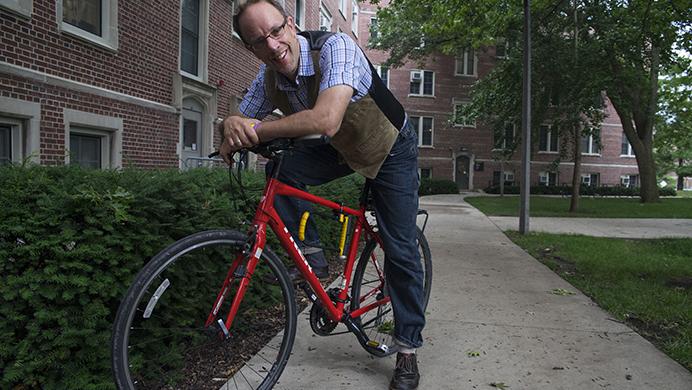Schreier to ride bike across Midwest to aid LGBTQ centers
University Counseling Service Director Barry Schreier will pedal across the Midwest to raise money for the LGBTQ resource centers at the UI and Purdue University.
The Daily Iowan; Photos by Ben S
Barry Schreier, the director of the University Counseling Service, sits on his bike outside Westlawn on Tuesday. Schreier will begin a bike journey to West Lafayette, Indiana, beginning Saturday to raise money for two LGBTQ centers. (Ben Smith/The Daily Iowan)
July 12, 2017
Barry Schreier will soon bike more than 300 miles across the Midwest to provide LGBTQ students with the resources he lacked when he was a gay college student in the 1980s.
Schreier, the director of the University of Iowa University Counseling Service, will ride his bike from Iowa City to West Lafayette, Indiana, from July 15-19 to raise money for the LGBTQ resource centers at the UI and Purdue University.
RELATED: Resource center marks 10 years of community aid
When Schreier worked at Purdue 11 years ago, he said, the university had an LGBTQ student organization but no LGBTQ center. But for the last five years, a center has served the LGBTQ community at Purdue.
A seasoned bike rider, he said he was planning to ride his bike to visit friends in Indiana and thought he should do something useful with his efforts.
“The gay, lesbian, bi, transgender, queer students are near and dear to me, having been a gay student myself,” he said. “I thought as long as I have the opportunity, I thought I would make use of the ride and raise money for the two centers.”
He started a GoFundMe page with a goal of raising $10,000 to split evenly between the universities’ two LGBTQ centers, and he believes it will be a reminder that the LGBTQ community is a vulnerable population in need of more support.
“I’m just glad to have the opportunity to keep awareness of LGBTQ students in the minds of friends and family and others through the donation of these funds,” he said. “Given our current political climate, I think the rights of LGBTQ people are under scrutiny again in negative ways, so rallying to raise funds and awareness, I think the timing, sadly, couldn’t be better.”
RELATED: LGBTQ history rich at the University of Iowa
Lowell Kane, the director of Purdue’s LGBTQ center, said Schreier’s fundraiser is an authentic and heartfelt gesture that is perfectly timed with the fifth anniversary of the center’s opening this week. The funds would be put toward scholarships and other resources to keep the center thriving, Kane said.
“We know that there’s going to be a direct impact toward the persistence and success of students,” Kane said. “There is a direct correlation between safe, affirming spaces and education and resources for students that have marginalized identities, so connecting them to the resources that are going to help them thrive and persist … that is what we are all about.”
Tab Wiggins, the UI assistant director for multicultural programs, said she appreciates Schreier for pursuing an endeavor that will benefit students and the community.
The funds Schreier raises will go toward programming efforts, staff training for those who work at the center, and student support such as leadership development opportunities and attending conferences, Wiggins said.
“This is the University of Iowa’s center for students — students and faculty,” she said. “It’s important for Barry to earmark the money for our campus because it’ll go straight back to our students.”
In the future, Wiggins said she hopes to see the UI administration allocate additional financial resources toward the cultural centers.
RELATED: UI leaders listen
With the exception of fiscal 2011 when additional funding was committed for programming relevant to the centers, funding had remained constant since fiscal 2003, Anne Bassett, the UI media relations director, said in an email to The Daily Iowan.
But in fiscal 2018, the budget for the centers “is allowing for [the Center for Student Involvement & Leadership] to work towards having a full-time staff member at each center, as well as additional funding for programming and student employees,” Bassett said.
This budget allocation comes after long-term investments in the centers were made in fiscal 2016 and 2017, she said. These funds largely fueled renovations to the buildings, as well as the purchase of new furniture and appliances.
When there are resources to help LGBTQ students and other vulnerable populations that face discrimination and prejudice, Schreier said, it is important to ensure those resources get the help necessary to keep providing assistance to the populations they serve.
“As a gay kid who also made his way through college back when … there was no such thing as gay student organizations or LGBTQ resource centers … I just kind of had to do it on my own, so I’m glad to see the development of those types of resources.”



